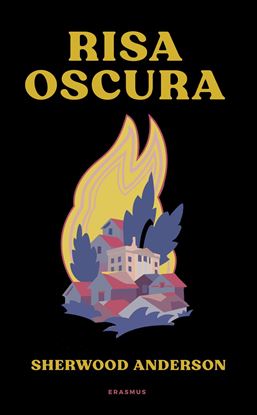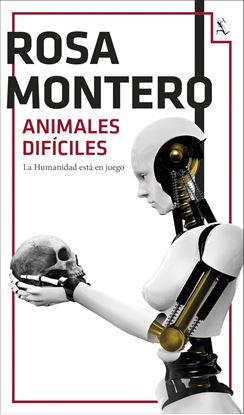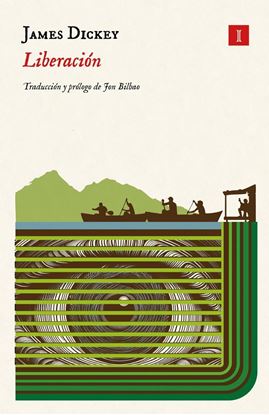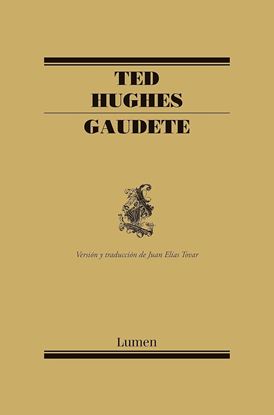

RISA OSCURA
Risa oscura es una pequeña Odisea moderna. Las llanuras del Medio Oeste, los grandes ríos, constituyen el telón de fondo de las peripecias del protagonista, John Stockton, un hombre huido de las convenciones sociales y en busca de un nuevo yo. En un mundo suspendido entre lo real y lo posible, entre el presente y la infancia, entre la biografía y la historia, se agita una constelación de personajes no resueltos, de figuras simbólicas.
Sherwood Anderson es incuestionablemente unos de los tres o cuatro titanes de las letras norteamericanas.
Risa oscura es la novela de la América del Medio Oeste, el valle del río Ohio, el Mississippi, Nueva Orleans y de la nueva libertad sexual de los años veinte. La tensión expresiva del lenguaje, la necesidad de una mayor adhesión a la vida, la urgencia de amar, de resolver el mito de la infancia y de dar por fin sentido a la propia existencia, son algunos de los temas que recorren una novela de gran intensidad, escrita en un lenguaje moderno, directo y esencial.
1,450
1,088
ANIMALES DIFICILES
En el Madrid de 2111, la detective Bruna Husky es contratada para investigar un atentado terrorista en las instalaciones de Eternal, una gran empresa tecnológica. Las primeras pistas la llevan hasta un periodista que sigue los pasos de uno de los asaltantes, pero cuando los implicados empiezan a desaparecer o a morir el rastro se pierde. La detective y su colega, el inspector Lizard, se verán atrapados en un enigma cada vez más sombrío, en una trampa mortífera diseñada por una mente criminal aterradora. Estamos ante una Bruna Husky llena de furia contra el mundo y, sobre todo, contra sí misma, porque ya no es una poderosa tecnohumana de combate, sino un débil androide de cálculo. Y es desde esa nueva fragilidad desde la que debe afrontar el caso más peligroso de toda su carrera.
Animales difíciles plantea aquello que no queremos mirar de frente: la inconsciencia con la que estamos desarrollando una superinteligencia desconocida, un poder absoluto, que no sabemos si seremos capaces de controlar y que puede convertirse en un arma definitiva y brutal.
Rosa Montero cierra por todo lo alto la serie de Bruna Husky, formada por las novelas Lágrimas en la lluvia, El peso del corazón y Los tiempos del odio. Espectacular, emocionante y peligroso, el último caso de la formidable detective es un apasionante rompecabezas de tensión creciente y final luminoso sobre el sentido de la vida y el destino de la Humanidad.
1,450
1,088
LIBERACION
Cuatro amigos emprenden un viaje en canoa por las atronadoras corrientes del río Cahulawassee, en el corazón de los remotos bosques de Georgia. Lewis, el cabecilla del grupo, campeón de tiro con arco, es un entusiasta de la vida agreste. Sin embargo, para el resto de sus compañeros el viaje es apenas una excusa para escapar de sus rutinas y una oportunidad, quizá la última, de contemplar el esplendoroso valle antes de que sea inundado y convertido en una presa. Pero la tranquila excursión en canoa se tiñe de sangre cuando se topan con unos lugareños que los atacan brutalmente. Es entonces cuando su apacible aventura se transforma en una pesadilla en la que tendrán que luchar por sus propias vidas, en un juego letal donde el hombre es cazador y presa a la vez, y el salvaje entorno del valle se torna en un cementerio de roca y aguas bravas para aquellos que carecen de la fuerza o la fortuna para sobrevivir.
1,450
1,088
SANGRE DE CHOCOLATE
Los tres vivieron en el siglo XIX, pero la manera en que conformaron sus vidas sigue resonando hoy en las nuestras. Boena Nemcová escribió a pesar de todo: de sus orígenes humildes, de la falta crónica de dinero, de escribir en una lengua minoritaria, de las obligaciones familiares que le exigía su marido, ciego al talento y a la voluntad de su esposa, de la estrechez intelectual que imponía el naciente nacionalismo checo frente a la dominación del Imperio austrohúngaro. George Sand, nacida en una familia aristocrática, no aceptó nada que no fuera la igualdad ante los hombres, como sus amantes Alfred de Musset y Frederic Chopin. Fue una de las escritoras más celebres de la Europa de su tiempo y una de las primeras mujeres que se quiso radicalmente libre. John D. Rockefeller es el primer gran ejemplo del sueño americano, del hombre forjado a sí mismo. Insensible a todo lo que no fuera acumular riqueza y poder, no dudó en eliminar rivales, arruinar empresas y arrasar la naturaleza si ello servía a sus intereses.
1,450
1,088
GAUDETE
Ted Hughes, uno de los grandes poetas ingleses de nuestro tiempo poeta laureado, famoso por su tormentosa relación con la escritora Sylvia Plath , escribió Gaudete, uno de los libros más singulares y experimentales de la poesía del siglo XX, en la cúspide de su madurez poética y volcó en la obra toda su experiencia y su capacidad de riesgo. Gaudete logra rebasar las fronteras de la poesía para convertirse en un libro indefinible, poliédrico. Es a un tiempo un guion cinematográfico, una novela y una secuencia de poemas que además experimenta una transformación estilística, desde el alucinado poema en prosa del prólogo, pasando por los poemas narrativos centrales, hasta los últimos, breves y oscuros poemas del epílogo. Una obra maestra, capital e inclasificable.
1,450
1,088
FISKADORO
Fiskadoro tiene catorce años y vive en los Cayos de Florida, en una comunidad de supervivientes del desastre nuclear que ha destruido el mundo. Durante el día ayuda a sus padres con la pesca en alta mar, aunque su verdadera aspiración es aprender a tocar el clarinete. Para lograrlo recurrirá a mister Cheung, manager de la Orquesta Sinfónica y viejo albacea de la cultura humana, que será su maestro y guía a través de las ruinas de la civilización y que además convive con su madre, una anciana obstinada en rememorar una y otra vez la caída de Saigón. En medio de este clima a un tiempo hostil y familiar, Fiskadoro deberá sobreponerse a las otras lecciones que conlleva crecer: saber despedirse cuando ya no queda nada y reponerse cuando queda todo por hacer.
Fiskadoro es una novela de formación atípica: la historia de un adolescente que vive en un mundo que ha regresado bruscamente a su adolescencia. Una distopía sobre cómo salvar los restos del pasado y reconstruir su cultura en un mañana peligrosamente cercano al nuestro, contada por uno de los escritores estadounidenses más extraordinarios de las últimas décadas.
1,450
1,088














